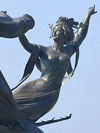|
Nu Wa (女娲)
Chinese
dragon-goddess, who –according to one
myth– created mankind from yellow clay, and –in another story–
repaired the Wall of Heaven, by cutting off the legs of a
tortoise
to use them as struts to hold up a pillar that initially supported
the sky but which collapsed and caused the sky to tilt. Thus, she
prevented total obliteration of everything and gave her the role of
repairer and maintainer. The latter account is reminiscent of the
Indian creation legend of the Churning
of the
Ocean of Milk,
in which the creator-god
Vishnu
incarnated as a tortoise to support a mountain with its
shell, to prevent it from sinking in the soft mud of the sea floor (fig.).
In another
account, it is described that Nu Wa's intestines
scattered into ten spirits, which reminds of yet
another
Chinese creation myth, in which
Pan Gu,
also described as creator of all
and the first living being,
died and
decomposed, after which
his intestinal worms became the Chinese human race. Some sources
also describe that Nu Wa emerged from the heavens to see the remains
of
Pan Gu. Nu Wa
is
sometimes depicted with the body of a serpent and ox-horns, or with
the head of an ox, possibly because she purportedly once tamed a
dangerous giant called King-of-Oxen, by running a rope through his
nose, hence she is said to have brought civilization, by taming wild
animals, as well as by teaching humans irrigation.
Additionally, Nu Wa is also presented in a historically
doubtful role as the first ever sovereign of pre-Imperial
China, in the
Three Sovereigns and the Five Emperors Period, next to some other
–equally unlikely– candidates from mythology, such as her brother
and husband
Fu Xi (fig.); the god of agriculture and founder of Chinese herbal
medicine
Shen
Nong
(fig.);
and the legendary Yellow Emperor
Huang Di (fig.).
Sometimes transcribed Nuwa and also pronounced Nu Gua (Nugua) or Nu
Kua (Nukua). In
Pinyin,
her name is transliterated Nǚ Wā.
See also
LIST OF CHINESE RULERS. 回






|

